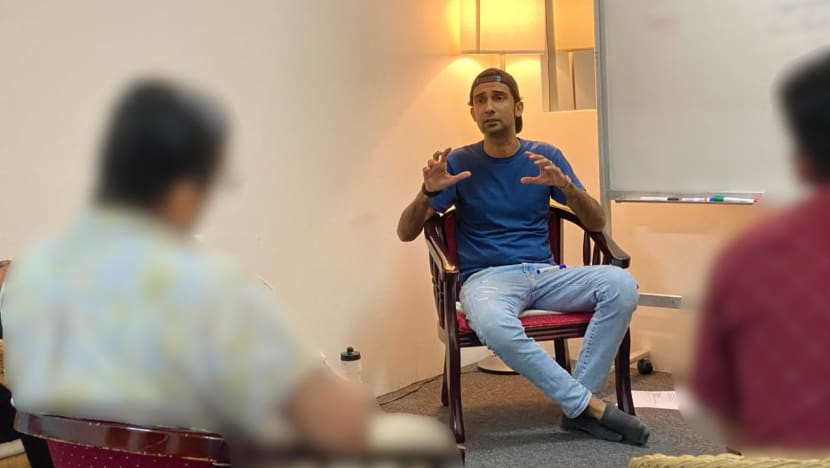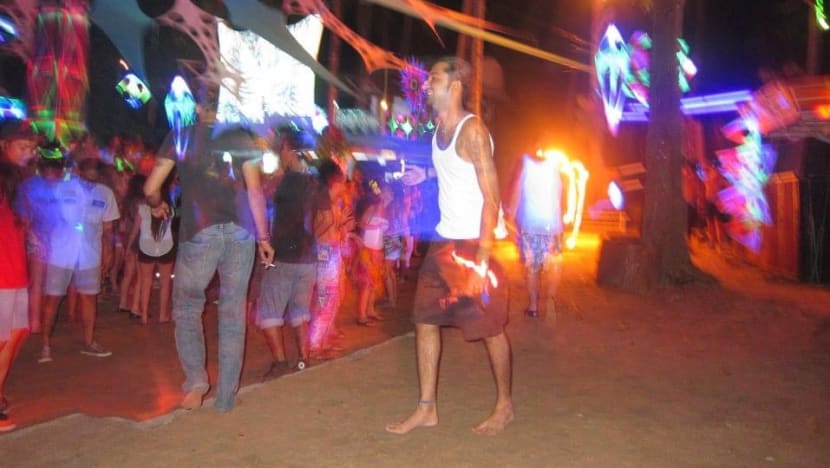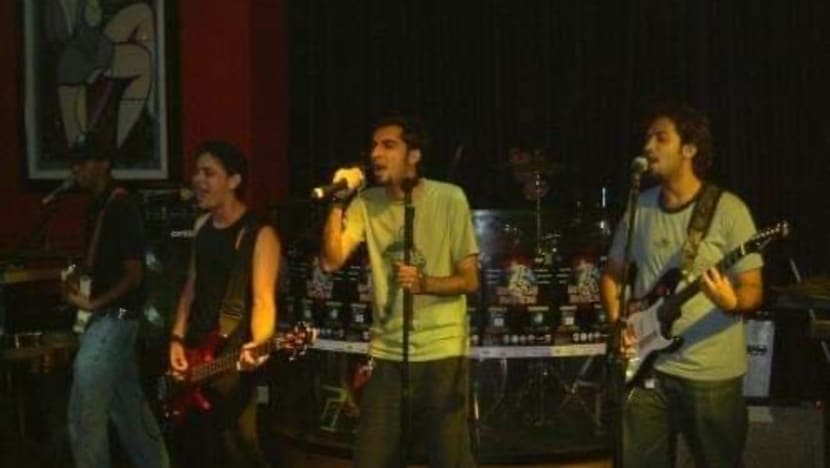From drug abuser to psychotherapist: How one man turned his life around
Mr Gopal Mahey spent about five years in jail after years of addiction caught up with him.

Drug abuser-turned-psychotherapist Gopal Mahey running a support group. (Photo: Gopal Mahey)

This audio is generated by an AI tool.
SINGAPORE: Psychotherapist Gopal Mahey has first-hand experience to lean back on in understanding clients with drug addiction.
He was once in their position after all.
Just a couple of years ago, he was behind bars – the culmination of decades of battling addiction to drugs and alcohol in the shadows.
Once a promising footballer, a broken ankle at the age of 16 left him with a void in his life, which he filled with alcohol, people who may now be considered at-risk youth and a punk rock band he formed with friends.
“Access to cannabis was available, and at that point, when I mixed enough cannabis with alcohol, it kind of opened up a part of my brain I never thought existed. So very wrongly, with a false belief that cannabis would help in the songwriting process, I started using,” the 42-year-old told CNA.
But he did not find the creative flow he was looking for.
Although he managed to get a job in a different industry by chance, that ended up feeding his addiction even more.

“I stumbled my way into a job interview in the airline industry and, very quickly, I became a cabin crew, which then opened up access to drugs all over the world,” he said.
“I was living this chaotic life of functioning and surviving. I became a high-functioning addict.”
His grandfather’s death eventually brought him back to reality. In a bid to understand himself better, he enrolled in a diploma course in counselling psychology and managed to make a career switch. He found himself counselling inmates at Changi Prison.
Although he was not abusing drugs, he was drinking and smoking heavily.
“I would hear stories of all this pain and suffering and struggle, and at night I would drink all of these memories away. So at that point, I was drinking six cans of beer and smoking about two packs of cigarettes,” he recalled.
SLIDING BACK INTO DRUGS
It did not take long for friends from his past to come back to haunt him, introducing him to new drugs he thought he could use but still keep a lid on.
“This time, methamphetamine was totally out of control. And as an addictions counsellor, I could see myself escalating, losing control, but I just couldn't reach out for help. I was trapped within my own cycle of addiction, not realising that I was never ever in recovery - I have been an addict since I was 16,” he said.
In 2013, about a year into his marriage and after obtaining a master’s degree in counselling, his habits finally caught up to him. He was arrested and spent more than five years in jail.
“I was able to gain knowledge and insight into becoming an addictions counsellor because I was in the system. I came across so many inmates who are in various stages of recovery. Some of them were thinking of change, some of them were not even thinking about change,” said the senior counsellor at the Centre For Psychotherapy.

If the arrest did not make clear the need to change his ways, a sobering incident in 2018 did. He had chalked up enough points from good behaviour to earn himself an open visit in prison. Aching to hold his son - who was born after he was jailed - for the first time, he reached out to him.
“I remember him saying no, because he didn't know me. And that was when I realised: ‘Okay Gopal, I think you really need to change’”, he said.
His family also rallied behind him.
“I realise my arrest is actually my blessing, because it saved me from myself,” he said.
But not all abusers enjoy such strong support and Mr Gopal now dedicates his life to being that pillar for others. His job is keeping him on his toes, with the drug scene getting more complicated now.
NEW PSYCHOACTIVE SUBSTANCES
New psychoactive substances (NPS) are emerging, and abusers are starting their addiction as young as 14, influenced by the internet, he said.
These drugs mimic the effects of controlled drugs like cocaine, heroin and cannabis. Manufacturers of these drugs develop new chemicals to replace those that are banned, which means that the chemical structures of the drugs are constantly changing to get around the law.
"It is very worrying because the uniqueness of NPS is you do not know the source and the origin and what's going into all of this. You've literally got people who are not trained and becoming chemists and just creating these substances for people's consumption,” said Mr Gopal.
NPS can take various forms like tobacco packs and postage stamps.
Between 2014 and 2017, 11 people were arrested for using NPS. This increased to 235 people per year between 2018 and 2022, Home Affairs and Law Minister K Shanmugam told CNA938’s Singapore Today on Thursday (May 16), adding that the rising number of NPS abusers locally is a concern.
"If we don't do anything, it will jump very high. So, we are again, doing a lot of things - looking at how these things can get imported, how we can raise awareness of NPS, what the consequences are," he said.
However, the situation is under control because of the laws in place, said Mr Ng Khai Song from the Central Narcotics Bureau (CNB).
In March 2023, Singapore passed amendments to drug laws to combat these new drugs more effectively. Such substances are now deemed illegal based on their capacity to produce psychoactive effects, rather than their molecular structures.
“That said, we continue to pay very close attention to NPS because it has increased exponentially in other countries,” Mr Ng, who is the director of CNB’s policy, planning and research division, told CNA.
Today, there are over 1,000 types of NPS in the illegal drug scene worldwide, said Mr Ng. Some NPS are known as “legal highs” and some young people may think they are safer than other drugs, he added.
“In fact, some of them may even be more harmful because they are synthesised in the lab,” he said.
CATCHING SIGNS BEFORE IT’S TOO LATE
Most abuse takes place within closed doors, whether at home or a friend’s home, he said.
“It's easier for the parents to look out for these telltale signs (of drug abuse) and engage their children before it's too late. It's very hard for other members of the public - whether or not it's their teachers, or others - to really identify all these telltale signs and engage them,” he said.
Mr Gopal stressed that drug addiction can affect anyone.
“You can be from a middle-income family, you can be working in the community. Addiction does not look at your race, it does not look at your socioeconomic status. It does not look at your life position,” he said.
“Once addicted, it just ravages you. There is no coming back until you are able to purposely put yourself into that need for help.”
Both he and Mr Ng said a new initiative to recognise the suffering caused by drugs, the annual Drug Victims Remembrance Day - the first of which was marked on Friday - is important. The occasion was marked with an event at Ngee Ann City, which included a roving exhibition on drug abuse.
The commemoration has brought this dialogue on addiction up to the national consciousness, said Mr Gopal.
“Addiction for very long has been in the shadows. It's really taboo. It's not something that we really want to talk about. I think what this has done is it has allowed us as a society to acknowledge that this is here, this is happening.”

















